The city of Oak Harbor needs to get out of the way of developers and allow the growth and development that will spur the economy and fix the housing shortage.
Two candidates for city council offered this message during a packed candidates’ forum at the Oak Harbor Chamber of Commerce meeting at the Elks Lodge Thursday.
The two men, Michael Crawford and Jeffrey Mack, are on the same page when it comes to city issues, focusing on the need for development and touting investors who’ve faced governmental roadblocks.
Crawford is running against Councilwoman Tara Hizon and Mack is facing Joseph Busig for the seat that Councilman Rick Almberg is giving up.
“We’re at the point where we need to build, build, build,” Mack said, also saying that the city’s urban growth area needs to expand.
“Growth is key,” said Crawford, who added that the way the city treats developers “needs to change.”
Hizon touted her accomplishments in her two terms in office, which included her successful efforts to get the council meetings streamed online, to place security cameras in Windjammer Park and to allow permitted events to have alcohol in city parks. She explained and defended city actions on different issues.
“Criticism is not leadership,” she said. “What we need is ideas.”
Busig said he will represent the working class of Oak Harbor on the council. He focused on the need for affordable workforce housing, which he said should be located near public services and be ADA compliant. A recent and well-spoken graduate of Oak Harbor High School, Busig said his youth, 19, shouldn’t deter voters, pointing to his involvement in such groups as the Oak Harbor Youth Coalition, Citizens Against Domestic and Sexual Abuse and Students Against Destructive Decisions.
“What I lack in age I make up for in experience,” he said.
Oak Harbor Mayor Bob Severns faced off against candidate Pat Harman. Severns emphasized the differences between him and Harman, pointing out his long history in Oak Harbor. He worked at a successful business for years, was a councilman before becoming mayor and is chairman at the NAS Whidbey Task Force. He said the city’s relationship with the Navy is key.
“I will provide as much energy as I can to continue that relationship,” he said.
Harman spoke about financial responsibility in pithy and simplistic terms. He argued that the city leaders haven’t been good guardians of the city’s budget, pointing to the new sewage treatment plant, the decision not to fix the boat lift in the marina — which led to Race Week leaving the city — and the closure of the RV park. He predicted that the city’s ballot measure to raise taxes to fix roads will go down in flames.
“It’s a budget exercise, not a taxing exercise,” he said about the solution for fixing streets.
The most pointed exchanges were between Hizon and Crawford. In answering a question about what they would do if an extra $5 million magically appeared, Hizon said the residents should get to vote on a list of ideas. Crawford countered that the city spent $40,000 on the “tubular” oak leaf sculpture on the highway, and he didn’t recall getting to vote on it. He said the money could have been spent on other priorities.
Hizon, however, explained that a basic element of government is that the city’s money is divided among different funds that can only be used for specific things. The money from the arts fund cannot be used to fix sidewalks, for example.
“It’s apples and oranges,” she said, adding that the volunteers on the city’s arts council chose the oak-leaf sculpture.
Later, Crawford said he didn’t want to go negative but then promised that he will go to all the meetings if he’s elected, an apparent reference to the fact that Hizon, who has a day job, misses some meetings.
“It’s a matter of professionalism, in my opinion,” he said. “You stepped up … you wanted the job, so you need to show up.”
Both Crawford and Mack bemoaned the lack of plans to guide the city into the future. Crawford said there simply hasn’t been a good plan in place.
Mack said the city is stagnant and that coming up with a good plan isn’t that hard. He said investors and “smart people” should get together and create the plan.
Both Crawford and Mack spoke against the transportation benefit district’s ballot measure to raise taxes by two-tenths of 1 percent for street repair and maintenance over a 10-year period. Crawford said the citizens are still reeling over the tripling of sewage rates because of the cost of the new “poop factory.” They both said there must be other options for fixing crumbling streets than a sales tax increase or a car tab fee, which are two choices available through the transportation benefit district.
“There has to be a better way than reaching into their back pockets,” Crawford said.
Mack also said a 10-year plan is too long and he would do it over 12 to 24 months.
Busig and Hizon spoke in favor of the measure. Busig pointed out that the lack of street repair has been a problem for a long time and that it’s something that needs to be done. Hizon said the tax is a “no-brainer.” The state of the streets, she said, is a result of a law that prohibits the city from raising its share of property taxes each year by more than 1 percent when inflation is usually higher. The city gets farther and farther behind, she said.
Fixing the streets is vital to economic development, she added.
“If we aren’t willing to invest in our community,” she said, “why would we expect anyone else to?”



